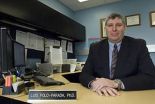(Press-News.org) COLUMBIA, Mo. – A team of researchers from the University of Bristol, Natural History Museum of London, the University of Missouri and Ohio University has discovered the eating habits of Diplodocus using a three-dimensional model of the dinosaur's skull. The eating habits of the herbivore have been uncertain since its discovery more than 130 years ago. Understanding these behaviors could help scientists better understand extinct and modern ecosystems and what it takes to feed these giant herbivores, as well as today's living animals.
Diplodocus was a giant, herbivorous sauropod dinosaur from the Jurassic period, which was around 150 million years ago. The dinosaur, which was more than 170 feet long and weighed more than 12 tons, was the longest animal ever to walk the planet. Its neck was about 20 feet in length.
"Since Diplodocus was such a huge animal, its eating habits and behavior have always been a question in the paleontology community," said Casey Holliday, an assistant professor of pathology and anatomical sciences at MU. "With the 3D model of the skull, we were able to simulate three eating scenarios using a computer-based analysis to determine the stresses that the skull would experience in each situation."
Using data from a CT scan, the team of researchers designed a three-dimensional model of the 2.5-foot-long Diplodocus' skull and tested it using finite element analysis (FEA). FEA, which is commonly used to aid in mechanical engineering and design, revealed the stresses on the dinosaur skull from three different eating behaviors: a normal bite, "branch stripping" and "bark stripping."
"Originally, some scientists in the early 1900s thought that Diplodocus would strip bark off of trees using its jaws to close down on the bark," Holliday said. "However, we found that this process places a lot of stress and strain on the dinosaur's teeth and skull, which could result in bone damage or breaking of teeth. The model and the scans showed that branch stripping, which is when the dinosaur would place its mouth on a branch and pull all the leaves off the branch, placed little to or no stress on the teeth and skull."
While the feeding habits of the Diplodocus have largely been resolved, the behaviors of other extinct animals also could be tested using FEA.
"Sauropod dinosaurs, like Diplodocus, were so weird and different from living animals that there is no animal we can compare them with," said Mark Young, a doctoral student at the University of Bristol and lead author on the research. "This makes understanding their feeding ecology very difficult. That's why biomechanically modeling is so important to our understanding of long-extinct animals."
Holliday thinks that findings from the Diplodocus feeding habits can help determine the ways extinct animals live, but he also said that understanding large, extinct animals will continue to help scientists' understanding of large animals today.
"Sauropods tell us about the evolution of gigantism, or giant body size, because they enable us to understand how much range or space giant animals really need to get around, and how much food they need to survive," Holliday said. "The findings on sauropods also help us understand today's giant herbivores, such as elephants and giraffes, and how they interact with their environments."
The study's authors included Paul Barrett, merit researcher at The Natural History Museum in London; Emily Rayfield, senior lecturer at University of Bristol; and Lawrence Witmer, professor of anatomy at Ohio University. The study was published in Naturwissenschaften, a natural sciences journal.
Research team discovers eating habits of Jurassic age dinosaur
2012-07-31
ELSE PRESS RELEASES FROM THIS DATE:
Liver cancer cells stop making glucose as they become cancerous
2012-07-31
COLUMBUS, Ohio – As liver cancer develops, tumor cells lose the ability to produce and release glucose into the bloodstream, a key function of healthy liver cells for maintaining needed blood-sugar levels.
The findings come from a study by scientists at The Ohio State Comprehensive Cancer Center – Arthur G. James Cancer Hospital and Richard J. Solove Research Institute (OSUCCC – James).
The loss of this type of glucose production, a process called gluconeogenesis, is caused by the over-expression of a molecule called microRNA-23a. The change might aid cancer-cell growth ...
ACP and SGIM find the PCMH model aligns with principles of medical ethics and professionalism
2012-07-31
PHILADELPHIA, July 30, 2012 -- The American College of Physicians (ACP) and the Society of General Internal Medicine (SGIM) explore the ethical dimensions of the patient-centered medical home (PCMH) in a new position paper published by the Journal of General Internal Medicine: "The Patient-Centered Medical Home: An Ethical Analysis of Principles and Practice." The text is also available on ACP's website (http://www.acponline.org/running_practice/ethics/issues/policy/).
"The PCMH model of care aligns well with the traditional principles of medical ethics and professionalism, ...
Grin and bear it -- smiling facilitates stress recovery
2012-07-31
Just grin and bear it! At some point, we have all probably heard or thought something like this when facing a tough situation. But is there any truth to this piece of advice? Feeling good usually makes us smile, but does it work the other way around? Can smiling actually make us feel better?
In a study forthcoming in Psychological Science, a journal of the Association for Psychological Science, psychological scientists Tara Kraft and Sarah Pressman of the University of Kansas investigate the potential benefits of smiling by looking at how different types of smiling, and ...
Researchers identify link between kidney removal and erectile dysfunction
2012-07-31
Researchers at the University of California, San Diego School of Medicine have identified a link between patients who undergo total nephrectomy - complete kidney removal - and erectile dysfunction. Results from the multi-center study were recently published online in the British Journal of Urology International.
"This is the first study in medical literature to suggest that surgery for kidney removal can negatively impact erectile function while partial kidney removal can protect sexual function," said Ithaar Derweesh, MD, senior author, associate professor of surgery, ...
Olympic star power squandered
2012-07-31
Your best chance to see a female athlete endorsing a product will be during the next few weeks. The Olympics' commercial breaks may be littered with female swimmers, runners and gymnasts, but don't expect to see them much again until the next Olympics. American companies rarely employ female athletes as spokespeople and when they do, according to two University of Delaware professors, they most often do it poorly.
John Antil and Matthew Robinson's upcoming article in the Journal of Brand Strategy suggests advertisers' tactics are creating a cycle of failure for female ...
1 in 5 streams damaged by mine pollution in southern West Virginia
2012-07-31
DURHAM, N.C. -- Water pollution from surface coal mining has degraded more than 22 percent of streams and rivers in southern West Virginia to the point they may now qualify as impaired under state criteria, according to a new study by scientists at Duke and Baylor.
The study, published this week in the peer-reviewed journal Environmental Science & Technology, documents substantial losses in aquatic insect biodiversity and increases in salinity linked to sulfates and other pollutants in runoff from mines often located miles upstream.
"Our findings offer concrete evidence ...
Humpback whales staying in Antarctic bays later into autumn
2012-07-31
DURHAM, N.C. -- Large numbers of humpback whales are remaining in bays along the Western Antarctic Peninsula to feast on krill late into the austral autumn, long after scientists thought their annual migrations to distant breeding grounds would begin, according to a new Duke University study.
The study, published July 30 in the journal Endangered Species Research, provides the first density estimates for these whales in both open and enclosed habitats along the peninsula in late autumn.
It suggests that the little-studied bays are late-season feeding grounds for humpback ...
Parents find terms 'large' or 'gaining too much weight' less offensive than 'obese'
2012-07-31
If doctors want to develop a strong rapport with parents of overweight children, it would be best if physicians used terms like "large" or "gaining too much weight" as opposed to the term "obese." These were findings recently published by medical researchers at the University of Alberta.
Geoff Ball, a researcher in the Faculty of Medicine & Dentistry with the Department of Pediatrics, worked with department colleagues Amanda Newton and Carla Farnesi to review articles about the important relationship between families and health professionals when it comes to addressing ...
Detecting cancer with lasers has limited use say MU researchers
2012-07-31
One person dies every hour from melanoma skin cancer in the United States, according to the American Cancer Society. A technique, known as photoacoustics, can find some forms of melanoma even if only a few cancerous cells exist, but a recent study by MU researchers found that the technique was limited in its ability to identify other types of cancer. Attaching markers, called enhancers, to cancer cells could improve the ability of photoacoustics to find other types of cancer and could save lives thanks to faster diagnosis, but the technique is in its early stages.
"Eventually, ...
Stem cell therapy could offer new hope for defects and injuries to head, mouth
2012-07-31
ANN ARBOR, Mich.—In the first human study of its kind, researchers found that using stem cells to re-grow craniofacial tissues—mainly bone—proved quicker, more effective and less invasive than traditional bone regeneration treatments.
Researchers from the University of Michigan School of Dentistry and the Michigan Center for Oral Health Research partnered with Ann Arbor-based Aastrom Biosciences Inc. in the clinical trial, which involved 24 patients who required jawbone reconstruction after tooth removal.
Patients either received experimental tissue repair cells ...


